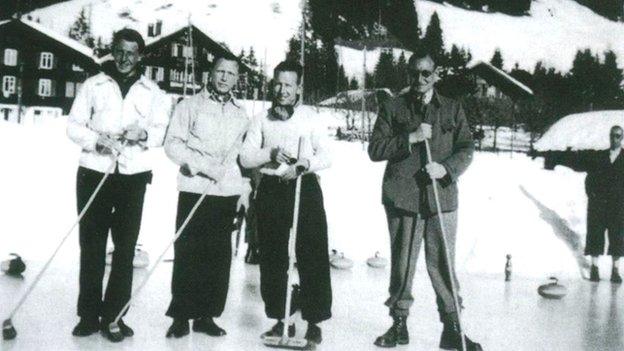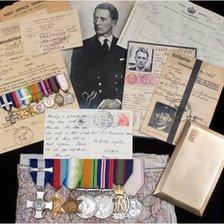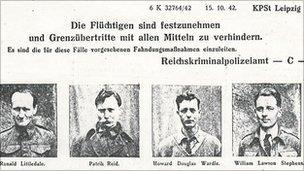Colditz escape: Tale of first British 'home run' revealed
- Published

The escapees were reunited briefly in Switzerland
Forged papers used by a British escapee from Colditz to make one of the first "home runs" back to the UK from the notorious German prisoner-of-war camp are being sold along with his medals. The tale of his ingenuity and success has become the stuff of World War II legend.
Perched high on a rocky outcrop overlooking the River Mulde near Leipzig, eastern Germany, Colditz castle was considered by German authorities in WWII the ideal site for a high-security prison for allied officers with a history of trying to escape.
But despite its "escape proof" label, the Gothic building witnessed 174 attempts by its troublesome, spirited inmates.
Nevertheless, just 32 men were ever successful - and only half of these managed the feat from within the castle.

Lt Cdr Stephens returned to Colditz once with his wife - in 1978
One of those was Lt Cdr William "Billie" Stephens, a charismatic naval officer who helped mastermind a daring escape for himself and three others.
The plan involved crawling through windows and creeping over roofs, past sentries and down a wall before fleeing to Switzerland posing as French workmen.
The paperwork forged to convince officials that Lt Cdr Stephens was a French workman is now being sold by his relatives.
Complete with rare gallantry medals, the lot is going under the hammer at Dix Noonan Webb auction rooms in London with an estimated value of £50,000.
It includes a forged leave pass with swastika stamps in the name of Jean Barder, a French electrician employed by the Germans, and a service pass with a photograph and stamps.
Hitler's order
Henry Chancellor, author of Colditz: The Definitive History, told the BBC that prisoners would be placed in solitary confinement if they were caught escaping from the yard.
"The British officer code was you had to try to escape, and the Germans knew that," he said.
"Once caught, if you gave yourself up, that was fine, but if you were impersonating a German soldier you could be shot."
He said just as Lt Cdr Stephens was on the run, Hitler issued an order stating that any allied commandos caught behind enemy lines should be killed immediately.
"That upped the stakes a bit. Even disguised as civilians they could have been shot if caught, but they may not have known about that at the time," he said.
Lt Cdr Stephens was sent to Colditz for escaping from a prison camp following his capture during the daring raid on a German naval base at St Nazaire, for which he was awarded the Distinguished Service Cross (DSC).
As he was being taken to Colditz, he escaped again by jumping from a train, but was captured the next day and eventually delivered to Colditz, where he spent his first week in isolation.
It took the Belfast-born officer five weeks to put his master plan in place, in collaboration with Maj Ronnie Littledale. Two others, Flt-Lt Hank Wardle and Maj Pat Reid, were brought in to join the plot.
Part of the planning involved using signals from a band conducted by Battle of Britain fighter ace Douglas Bader - who had lost his legs in a plane crash in 1931 - which practised in full view of the guards.
When the two sentries on patrol were at opposite ends of the courtyard, the band would pause their music to let the escapees know the path was clear.
On the night of 14 October 1942 the escapees set off, climbing through a window onto a flat roof. From there they descended into a floodlit garden busy with sentries, where they waited for a signal from the band.
But a German guard grew suspicious of the orchestra and the signalling failed, leaving the escapees to dodge the sentries using their own guile.
'Daredevil'
Wearing civilian clothes and socks over their shoes, they made their way to a storeroom from which they had planned to escape using a skeleton key.
But despite countless attempts, it failed to open, forcing them down to the cellar in search of an alternative route.
They found a narrow vent just 8 or 9 inches (about 20-23 cm) wide which led out to the bottom of the castle wall, and which they managed to squeeze through only by stripping naked.
From there they slipped past barracks, got dressed, then knotted sheets together to drop down three 12ft walls into a dry moat.
Having scaled the boundary fence, they split into pairs and made for a train, eventually reaching the Swiss border on foot within a day of each other.
The Gestapo put up wanted posters of the men, but all four went on to complete their "home runs" to Britain.
Lt Cdr Stephens was awarded a bar to his DSC because of the Colditz escape, which the auctioneers say is unique.
He eventually married a Swiss woman - Chouchou de Meyer - who had hidden him during his escape, and after the war they moved to France. The great escaper died in 1997, aged 85, several years after his wife.
By putting so many like-minded people together, the Germans had unwittingly created an escape academy.
Most nationalities had an escape committee to approve the latest schemes and draw up timetables to avoid duplication.
Some escaped while being transferred to or from hospital having feigned illness, some managed it by posing as German officers, and others by hiding in a well.
Author Henry Chancellor, who also made a TV documentary series on the subject, said he met some of the escapees at Colditz when they were in their 70s and 80s.
"They were fantastic, they were rebels, confirmed naughty boys who had spunk and a lot of spirit," he said.
"You could see that if enough of those people were put together, they could inspire each other."

The Gestapo put up wanted posters as the men fled
Maj Reid, whose memoirs triggered much of the initial interest in the story, wrote of his fellow escapee Lt Cdr Stephens: "He was handsome, fair-haired, with piercing blue eyes and a Nelsonian nose. He walked as if he were permanently on the deck of a ship.
"He was a daredevil, and his main aim appeared to be to force his way into the German area of the camp and then hack his way out with a metaphorical cutlass."
As far as Lt Cdr Stephens was concerned, his fortunes were as much about chance.
In his previously unpublished memoir, a copy of which is being sold as part of the auction sale, he said: "100% luck isn't good enough. You have to have the Devil's luck as well."